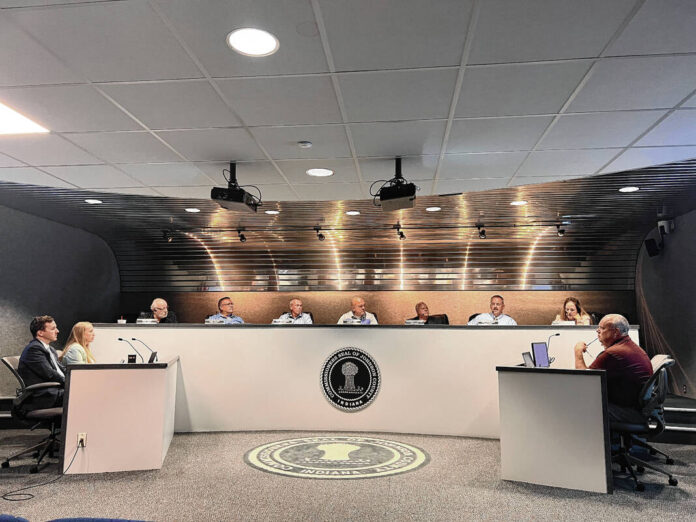People who live and work in Johnson County could soon be paying more in income taxes to help overcome a major shortfall in road funding.
The Johnson County Council is considering a .2% Economic Development Income Tax (EDIT), which would increase what those who work within the county pay in taxes on their adjusted gross income from 1.2% to 1.4%.
A tax increase is one step in a long solution meet the county’s road funding shortfall. A funding needs report compiled by the Johnson County Highway Department in March found the county needed to come up with about $390 million to pay for necessary road improvements over the next several years.
From Interstate 69 major access roads to aging concrete streets in subdivisions, Johnson County has a long list of road projects and not enough funds to get them done, according to the report and Luke Mastin, highway supervisor.
The report from March had concluded that the county is at a crossroads for road and bridge project funding and it needs an additional funding source.
If approved, a .2% EDIT would give the county $4 million in additional revenue each year starting in 2023 to put toward road projects. For an individual who makes $35,000 per year, for example, they would pay an additional nearly $6 in local income taxes with the new tax.
This type of tax falls under the umbrella of local income taxes, also known as LITs, that were created by the state legislature to allow counties to adjust income taxes to create revenue streams for local governments. An EDIT can be used to fund economic development projects, including capital projects like road construction.
Because of caps on property taxes, most counties in Indiana have taken advantage of EDIT as another stream of revenue. Seventy-three counties have imposed an EDIT.
However, the $4 million that would come in each year still would not be enough to fund all the needed road projects needed in Johnson County, officials say. Funding will still have to be pulled from other revenue streams.
The council also plans to repurpose a portion of the revenue from the LIT passed in 2019 to fund the Johnson County Jail expansion to free up money to pay for road projects. The Jail LIT, as it is referred to by county officials, was passed in 2019 and increased income taxes in the county by .2% as well. The revenue from that tax is being used to pay off the debt for the jail construction — which will be paid off in 2025 — as well as jail operating expenses and other criminal-justice related expenses.
A current plan on the table includes passing the .2% EDIT increase, and moving 50% of the jail operating expenses to jail LIT. Those expenses are currently being funded by county’s general fund; that will free up over $3.6 million in the general fund in 2023 and over $4 million after 2025 when the jail expansion is paid off.
The council also plans to pull $1.5 million this year and next year from its rainy day fund to get some road projects started.
That still would not fund every need, but would allow for construction of what have been deemed “priority projects.” Those projects mostly include reconstructing access roads to I-69, particularly Smith Valley Road.
Officials plan to add travel lanes on Smith Valley Road and CR 144 — a high-priority project expected to cost of $55 million. Other priorities include reconstructing and possibly widening Morgantown Road, extending Mullinix Road north of Smith Valley Road to connect to Bluff Road, and creating a new road between Stones Crossing and Olive Branch roads, according to the report.
Smith Valley Road already will not be complete by the time the I-69 overpass there opens in 2024, Mastin said. It is a priority to get that started as soon as possible because of the increased traffic flow expected.
The EDIT doesn’t just benefit the county, it would also be dispersed among the cities and towns in the county. Greenwood and Franklin would take in around $2 million each year from the tax, while the towns of Edinburgh and Bargersville would bring in $335,000 and $370,000, respectively. New Whiteland would bring in $149,000, Whiteland $138,000, Trafalgar $56,000 and Prince’s Lakes $55,000.
The .2% EDIT tax increase passed the council on first reading by a vote of 6-1 Monday evening, with council member Melinda Griesemer voting against it.
Griesemer said she did not think now was the time to increase taxes when people are grappling with inflation and other financial hardships as a fallout from the COVID-19 pandemic.
“Indicators are showing that we’re still going into where the next few years we’re going to be facing some hard times,” Griesemer said. “We’re not out of the woods with the whole downfall of COVID.”
Council member Jim Ison said he and the rest of the council recognize the concern that people are generally paying more for everyday items now. However, the county needs to act on this funding problem, he said.
“If not now when? If not us, who?” Ison said. “The county infrastructure is failing and it is way overdue.”
The tax increase proposal will come before the council again for a final vote at its next meeting at 6 p.m. Aug. 8. A public hearing where residents can share their thoughts on the proposal is also scheduled for that meeting.





